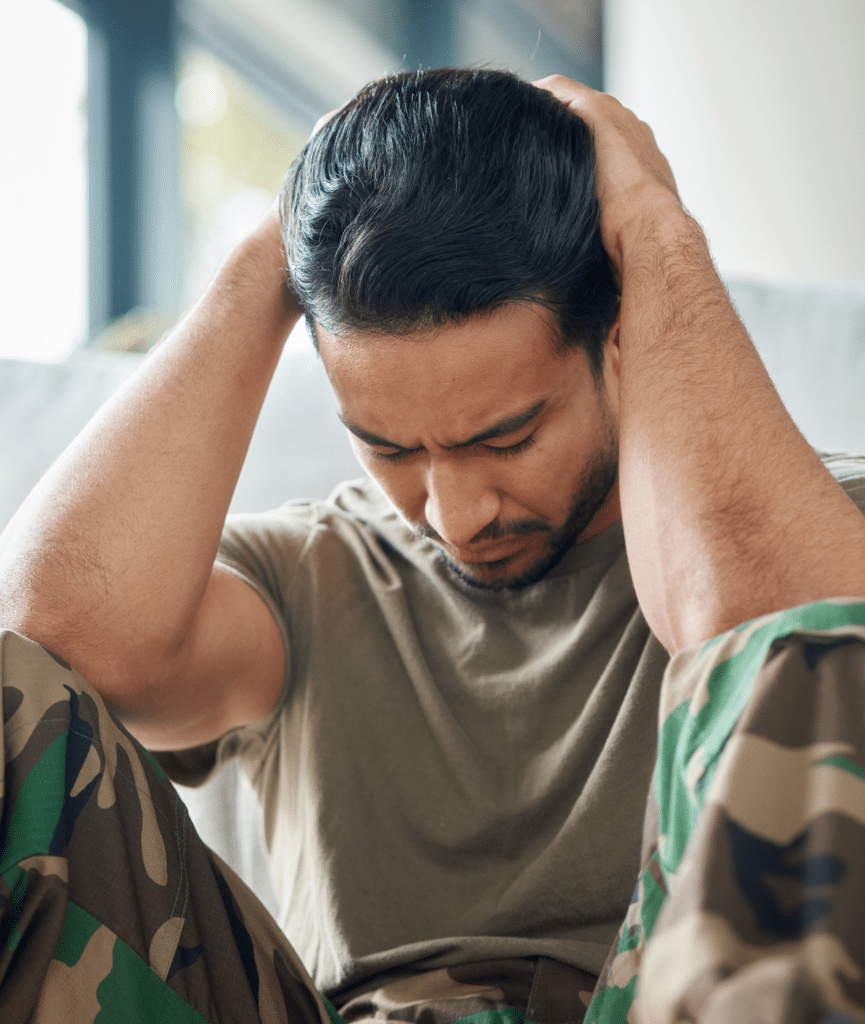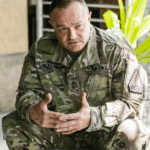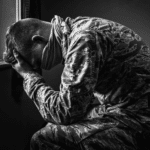Mental Health Conditions in Veterans: How Military Service Impacts Mental Health Long-Term

When Veterans come home, their service doesn’t just stay overseas – it follows them back in ways that aren’t always visible. Mental health in Veterans is an important yet often overlooked issue. Understanding how military service can leave long-lasting emotional impacts on someone is vital to supporting those who have served our country.
Military service mental health impacts are complex: Long deployments, combat stress, and then a sudden shift back to civilian life – these can all take a toll on a person’s well-being. Many Veterans struggle in silence for years after they hang up their uniform, battling with challenges like PTSD, depression, and anxiety.
Sometimes, these mental health difficulties can be fatal. Veteran mental health statistics show that around 18 U.S. Veterans die by suicide every single day.1 And while it’s easy to get carried away with the numbers, there’s one very important thing to remember: These are people’s lives.
This page will explore the long-term mental health challenges Veterans face. We’ll break down why they happen, and share what can be done to help. So, whether you are a Veteran, a loved one wanting to support someone, or simply want to understand more, you’ve come to the right place.

Military Service Mental Health Impacts
Serving in the military can have huge effects on your mental health, both whilst serving and afterward. If you or someone you know served the country, it’s vital to know these impacts. So, let’s take a look at some of the factors right now.
Combat Exposure in Veterans
One of the biggest factors affecting and increasing the risk of mental health issues in Veterans is their exposure to combat. The immense stress and trauma of being in life-threatening situations can lead to conditions such as Post-Traumatic Stress Disorder (PTSD), depression, and anxiety.
Research shows that deployment can increase your risk of PTSD, with a person being three times more likely to struggle with this if they were deployed compared to those who were not.2
Training and Culture Among Veterans
It’s not only combat situations that impact mental health – it can start with training. The training process is long and intense with strict discipline that can be a culture shock to many people – any Vet will agree that it takes getting used to.
While training, you’re separated from your family. And some Vets say you swap out your individuality for becoming part of a strong military unit. What’s more, your time is managed by someone else – you are essentially trusting another person to control your time and daily living habits for months on end.
And finally, training and the military culture are tough to endure and can be extremely physically and psychologically stressful.3
Separation From Loved Ones
One aspect of military life that is often overlooked is the effect of being away from your family for months or even years on end. It can be lonely, and the return home can be tough. You may find that your children have grown up and that it takes time to settle back into your relationship with your spouse.
It’s normal to feel anxious, depressed, disconnected, or even guilty about everything that you’ve missed while you’ve been away serving your country.
Challenges in Reintegration
Returning to your old civilian life can also be challenging: Adjusting to a slower pace of life, going back to a “normal” environment, looking for work, and rediscovering who you are outside of the military. Add to this the possibility of PTSD or anxiety from being in combat, and returning to your pre-military life can feel very difficult.4
The Significance of Early Intervention
Recognizing mental health issues and finding support early on can make a massive difference for Veterans returning to civilian life. Many Veteran stress disorders, like PTSD and anxiety, tend to get worse if you don’t treat them. The earlier you get help, the sooner you can feel better.
And while you may want to focus on everyone else but yourself, post-deployment mental health isn’t something to be brushed aside or ignored.
Fortunately, the difficulties Veterans face are now well-recognized, and many organizations can help you early on so that the issues you’re struggling with now don’t become colossal challenges. But more on this soon. First, let’s look in more depth at what mental health issues Veterans may experience.
Long-Term Mental Health Issues in Veterans
Unfortunately, mental health in Veterans can become a real challenge, affecting every area of your life, right from your relationships to how you feel about yourself. Here are some of the most common issues faced by Veterans today:
PTSD in Veterans
If you’ve seen combat, or been on life-threatening missions, you’re more at risk of developing PTSD. According to the Department of Veterans Affairs (VA), seven out of every hundred Veterans experience PTSD, with deployment raising your risk of PTSD to three times that of those who were not deployed.2
Depression in Veterans
The military environment can lead to depression. The separation from loved ones, the stress of combat, and being in danger all contribute to the risk of depression.5 According to recent data, 13.5% of U.S. Veterans experience depression.6
Anxiety Disorders in Veterans
After being in such stressful situations during your military service, it wouldn’t be a surprise if you find yourself more restless, jumpy, or on edge than you used to be. You may find yourself worrying more, or getting physical symptoms like a racing heart, without knowing why. These can all be signs of anxiety or an anxiety disorder, which are commonly experienced among Vets.
Research suggests that around 22% of Veterans have mild anxiety symptoms, with nearly 8% of Veterans likely to have generalized anxiety disorder (GAD).7
Suicide Rates Among Veterans
The issue of suicide among Veterans is hugely concerning and reflects the challenges of mental health in Veterans who have served in the military. Veteran mental health statistics show that around 18 U.S. Veterans die by suicide every single day, which is 1.5 times higher than the general population.1,8
There are several factors at play when it comes to an increased suicide risk among Veterans:
- Mental Health Disorders: As we’ve previously talked about, Vets are more at risk of mental health disorders. These are linked to a higher risk of veteran suicide8, with depression, bipolar disorder, anxiety disorders, and PTSD being the most strongly connected.
- Social Isolation: Loneliness is a strong factor when it comes to suicidal thoughts and suicidal behaviors. Loneliness can be common for Veterans, especially as you enter back into civilian life, as it can feel like no one understands what you’ve been through.9 Reducing feelings of loneliness and social isolation may reduce the likelihood of dying by suicide in Veterans.
- Access to Firearms: Firearms can become deadly if you are in a crisis or thinking of suicide. They account for nearly 70% of male and 42% of female veteran suicide deaths.8
This paints an upsetting picture for those who have worked so hard and fought to protect people. However, hope is far from lost. There are many ways Veterans can get support when facing these struggles. It all starts with having good access to mental health treatment, community support programs, and crisis intervention.
If you are a Veteran having thoughts of suicide, please seek immediate help. We provide some resources below with numbers to call if you’re struggling.
Mental Health Treatment for Veterans
For Veterans experiencing PTSD, depression, or anxiety, accessing effective mental health treatment is crucial. Thankfully, help is available through therapy, medication, and many resources and organizations specifically aimed at Vets. Let’s explore ways of improving mental health in Veterans.
Psychotherapy
Psychotherapy is really effective at treating a whole range of mental health conditions. The top evidence-based therapies for Veterans include:
- Cognitive Behavioral Therapy (CBT)
- Eye Movement Desensitization and Reprocessing
- Interpersonal psychotherapy
- Group therapy
- Telehealth psychotherapy
Therapy is a successful treatment for depression and anxiety, especially cognitive behavioral therapy (CBT) and interpersonal psychotherapy (IPT).5
If you prefer more alternative forms of support, holistic treatments such as meditation and yoga can be hugely beneficial.
Medication
Medications can be used to reduce PTSD mood-related symptoms, with selective serotonin reuptake inhibitors (SSRIs) and serotonin-norepinephrine reuptake inhibitors (SNRIs) having the most research to support their effectiveness.
When treating depression or anxiety in Vets, SSRIs are usually the first-line treatment. However, there are other types of antidepressants available that can also help with depression and anxiety if SSRIs aren’t suitable for you.5
Veterans Affairs (VA) Mental Health Services
The VA supports millions of Veterans every year with their mental health. They can provide you with support, ranging from peer support with other Veterans to counseling, therapy, medication, self-help, or a combination of all of those. There are even apps to help you manage PTSD symptoms, stress, depression, and more.
In addition, appointments don’t need to be in-person – they can be virtual, as long as you have a computer or mobile device you can use. They can also provide in-patient care as well as emergency and crisis mental health care.10
Coping Strategies for Veterans
Professional help is often the key to recovering from mental health issues. However, you can benefit from learning strategies to help you with everyday life, regulating emotions, and managing stress. Here are some tips to get you started:
- Self-Care: Looking after yourself is important, both mentally and physically. Keep physically active to get those mood-boosting endorphins, eat a healthy balanced diet to get all the vitamins you need to stay mentally and physically healthy, and do things that bring you joy.
- Connect With Your Purpose: Sometimes it’s difficult to know who you are outside of the military. It can be really fulfilling to volunteer for a project you are passionate about or to discover hobbies you love and want to develop.
- Mindfulness Techniques: Mindfulness can ease stress and help you stay grounded in the present, whether that’s through meditation, deep breathing exercises, or guided relaxation.
- Build a Support Network: Staying connected to people is one of the best ways to support mental health in Veterans. Whether it’s friends, family, support groups, or peer networks, it’s good to have someone to talk to so that you don’t feel isolated or alone with your challenges.
- Create a Routine: If you miss the structure that you had while serving in the military, try creating your own routines at home. Set an alarm to wake up in the morning, have meals at regular times, and you can even set yourself objectives for the day. It’s all about finding out what works best for you.
- Access Resources: There are various online and in-person resources available to provide support for veteran mental health. Check out the next section for some of these.
- Seek Professional Help: When you feel like things are too much and you need some help with your mental health, getting support from a professional can be the best thing to do. At Mission Connection, we can provide a personalized treatment plan for you based on your needs and goals. From therapy to medication to group sessions, we can support you so that you can feel better.
Resources for Veterans’ Mental Health
When you’ve served our country, the least we can do is provide the support you need when you return home. Below, we’ve compiled a list of essential resources to support you:
- Veterans Crisis Line: Open 24 hours a day. Call 988, then press 1. They also offer a confidential online chat service, and you can text them as well at 838255. If you have hearing loss, you can call TTY, or dial 711, then 988.
- VA Resources: The VA has a variety of resources and information available to Veterans. Click here to see the resources they can offer.
- National Centre for PTSD: For information about PTSD, treatment, and locations, visit their website or call (802) 296-6300.
- National Institute of Mental Health (NIMH): Offers information about mental health topics, including PTSD, depression, anxiety, and medications. Call (866) 615-6464.
Reach Out to Mission Connection Today
Managing your mental health can feel like a full-time job, especially if you’ve recently returned from deployment. If you’re struggling, know that you’re not alone – many of your fellow Vets have been, or are currently, in your shoes. Seeking support is the most courageous step you can take, and we are ready to help you through your struggles.
The team at Mission Connection works closely with you to discover what is important to you so that we can create your personalized treatment plan. Whether you are interested in therapy, or medication management, or just want to find out how we can help, we are here and ready to listen.
If you’re ready to take the next step on the road to recovery, call us or fill out our contact form to speak to one of our friendly and professional advisors.

References
- Sage, D. (2024, December 19). VA releases 2024 National Veteran Suicide Prevention Annual Report. VA News. https://news.va.gov/137221/va-2024-suicide-prevention-annual-report/
- U.S. Department of Veterans Affairs. (n.d.). Common problems Veterans experience. https://www.ptsd.va.gov/understand/common/common_Veterans.asp
- Bonner, M., & Ellender, G. (2022). Military training: Does it predispose service personnel to negative mental health issues? Journal of Mental Health Disorders, 2(1), 11–18. https://doi.org/10.33696/mentalhealth.2.012
- Paat, Y., Dorado, A. V., Myers, N. W., Martinez, A., & Scully, S. (2025). Mental health challenges and barriers to Veterans’ adjustment to civilian life on the U.S.–Mexico border. Healthcare, 13(3), 220. https://doi.org/10.3390/healthcare13030220
- Moore, M. J., Shawler, E., Jordan, C. H., & Jackson, C. A. (2023, August 17). Veteran and military mental health issues. StatPearls. https://www.ncbi.nlm.nih.gov/books/NBK572092/
- Trivedi, R. B., Post, E. P., Sun, H., Pomerantz, A., Saxon, A. J., Piette, J. D., Maynard, C., Arnow, B., Curtis, I., Fihn, S. D., & Nelson, K. (2015). Prevalence, comorbidity, and prognosis of mental health among US Veterans. American Journal of Public Health, 105(12), 2564–2569. https://doi.org/10.2105/ajph.2015.302836
- Macdonald-Gagnon, G., Stefanovics, E. A., Potenza, M. N., & Pietrzak, R. H. (2024). Generalized anxiety and mild anxiety symptoms in U.S. military Veterans: Prevalence, characteristics, and functioning. Journal of Psychiatric Research, 171, 263–270. https://doi.org/10.1016/j.jpsychires.2024.02.013
- Ruiz, F., Burgo-Black, L., Hunt, S. C., Miller, M., & Spelman, J. F. (2022). A practical review of suicide among Veterans: Preventive and proactive measures for health care institutions and providers. Public Health Reports, 138(2), 223–231. https://doi.org/10.1177/00333549221085240
- Sage, D. (2023, May 24). Reducing loneliness may reduce the likelihood of suicide. VA News. https://news.va.gov/119959/reducing-loneliness-may-reduce-suicide/
- U.S. Department of Veterans Affairs. (2024, February 15). VA mental health services. https://www.va.gov/health-care/health-needs-conditions/mental-health/






